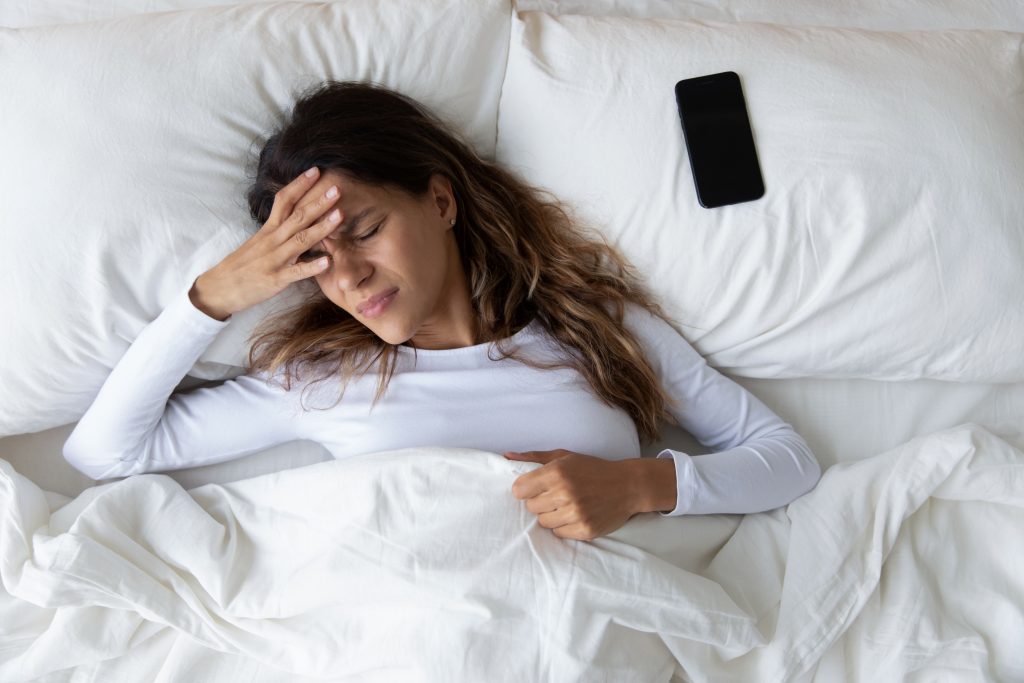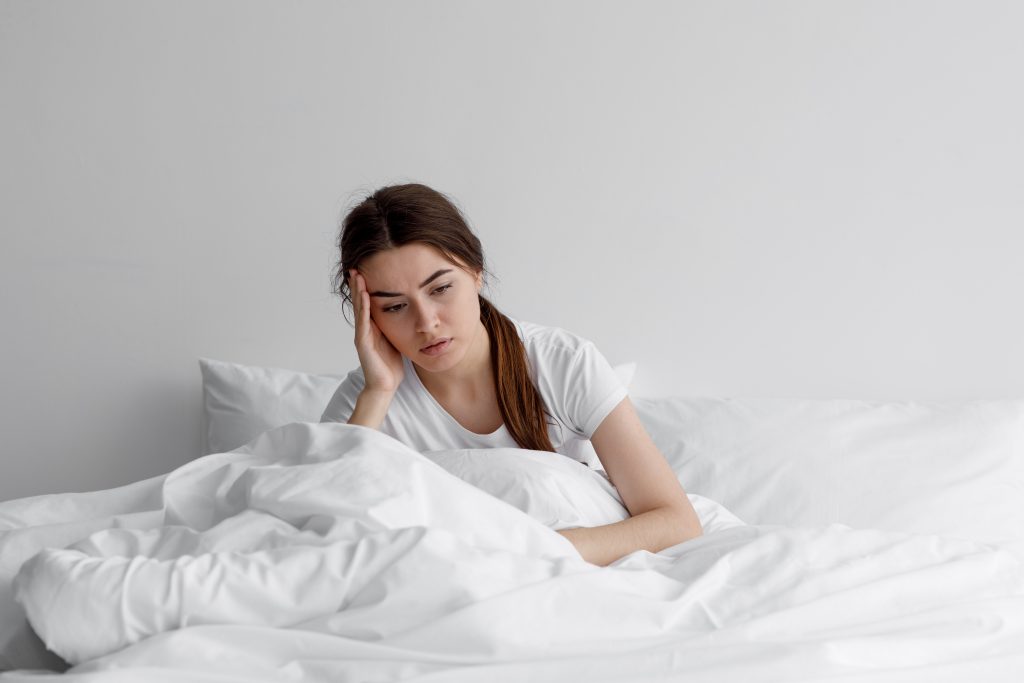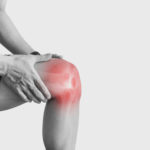December 2, 2021
10 Reasons You Wake Up With a Headache Every Morning and How to Get Rid of Them
Do you find yourself waking up with headaches in the morning? Are you waking up with a headache every morning? Then you’ve got some digging to do. Morning headaches are very common, and usually, they don’t just happen out of the blue. That throbbing pain in your head likely has an underlying cause, and to get rid of your morning headaches, you’ll need to figure out what’s triggering them.
To get you started, here are 10 of the most common culprits behind morning headaches and what you can do to alleviate them.
What Causes Early Morning Headaches?
If you’re like many morning headache sufferers, the origin of that pulsing pain in your skull is probably tied to lifestyle habits, sleep disruptions, or a poor sleeping position. But your mental health can play a role in triggering morning headaches, too.
If you feel like you’re always asking yourself, “Why do I have a headache when I wake up?” here are the most common causes you’ll want to consider:
1. Lack of Sleep
If you feel like you’re always waking up with a headache, sleep deprivation may be the culprit. When you have trouble either falling asleep or staying asleep, or you wake very early in the morning and can’t go back to sleep, you may have insomnia.  Over time, a lack of uninterrupted sleep can increase your risk for morning headaches.
Over time, a lack of uninterrupted sleep can increase your risk for morning headaches.
According to the American Headache Society, insomnia is the most common sleep complaint among people who routinely wake with bad head pain. Since the brain regions that regulate sleep also impact headaches, missing out on shut-eye increases your chance of suffering a morning headache.
Whether you’re dealing with sudden sleep deprivation or think you may have chronic insomnia, consider seeing your doctor for a diagnosis. Based on your sleep history and symptoms, your physician can recommend medications or therapy that can help you get your sleep back on track.
2. Sleep Apnea and/or Snoring
Sleep apnea disrupts sleep by causing repeated, short-lived breathing interruptions while a person snoozes. The condition is often marked by chronic, loud snoring, but not everyone who suffers from sleep apnea is a noisy sleeper.
Because the condition interferes with normal sleep and can wake a person several times during the night, it’s a major risk factor for morning headaches and fatigue. When your body doesn’t get enough restful sleep, it boosts the production of pain-inducing proteins, which can both reduce your pain tolerance and trigger a headache.
If you think you might have sleep apnea, some treatments that can help, but you’ll need to see a doctor for a diagnosis. Your provider may recommend that you lose weight, avoid alcoholic beverages, or quit smoking to improve your condition. A continuous positive airway pressure machine can also help you breathe easier while you sleep.
3. Oversleeping
Although it might sound a little backward, getting too much sleep can also trigger morning headaches. Often, oversleeping occurs as a result of getting low-quality sleep during the night or a mental health condition, such as depression. Both issues are risk factors for morning head pain.
4. Muscle Strain or Tension
Muscle tension or strain in your neck or the base of your skull (or both) is a risk factor for tension headaches. Your scalp can also experience excessive tension that may trigger a headache. If you feel like you have a lot of chronic tension in your neck or head region, it may be due to one of the following culprits:
- Chronic stress
- Poor posture
- Too-tight hairstyles
- Poor sleeping posture
Sleeping with the wrong pillow can also increase your risk of developing neck or head tension that provokes a morning headache. To help reduce your risk, use a pillow that allows your neck and head to maintain a neutral alignment with the rest of your spine.
5. Teeth Grinding
If you’re constantly waking up with a headache and your jaw feels tired and sore too, teeth grinding (also known as bruxism) may be at fault. When you grind your teeth at night, you overwork the muscles and tendons in your jaw, which can trigger head pain every morning.
If you suspect you’re grinding your teeth at night, your dentist can help. You may need to wear a night guard while you sleep, or you may need treatment for misaligned teeth. Bruxism can also stem from excessive stress or sleep disruptions. If you have trouble managing your stress, you may want to see a therapist for help.
6. Medications or Dietary Supplements
Although you might feel like you need to increase your consumption of pain medicine to combat your early morning headaches, that may not work in your favor. Certain over-the-counter and prescription medications are known to trigger morning headaches, especially with overuse.  These include:
These include:
- Nonsteroidal anti-inflammatory drugs
- Acetaminophen
- Aspirin
- Prescription pain medications
If you take any of these medications close to bedtime, they can also interfere with your normal sleep cycle, which may provoke a morning headache. Other medications and supplements that may trigger headaches include:
- Hormonal birth control and hormone supplements for menopause or andropause
- Medications that treat erectile dysfunction
- Blood pressure and cardiac medications
- Caffeine
If you currently consume any of the above substances, reducing your intake may help alleviate your morning headaches. But don’t make any changes without consulting your doctor first.
7. Alcohol Consumption
When you drink alcohol too close to bedtime, it’ll disrupt your sleep and significantly increase your chance of getting a morning headache.
While an alcoholic drink or two might help you fall asleep faster, alcohol disrupts REM sleep and may cause you to wake throughout the night. Since it negatively impacts your overall sleep quality, it’s a major driver behind morning headaches.
Alcohol may also cause you to go to the bathroom more frequently, which can lead to mild dehydration. One of the most common side effects of dehydration is a headache, so aside from poor quality sleep, fluid loss can also trigger morning head pain.
8. Migraine
If you’re always asking yourself, “Why do I wake up with really bad headaches?” you may be suffering from chronic migraines. According to the U.S. National Library of Medicine, migraines most commonly strike in the morning. Many people who suffer from them often wake up with severe, throbbing head pain.
9. Circadian Rhythm Disorders
Circadian rhythm refers to your body’s 24-hour internal clock. This clock controls your body’s natural sleep-wake cycle, and when it’s not set properly, you may suffer from morning headaches.
If you have any of the following sleep issues, you may be suffering from a circadian rhythm disorder:
- You wake too early and can’t get back to sleep.
- You have serious trouble falling asleep.
- You can’t seem to stay asleep and wake several times throughout the night.
Circadian rhythm disorders can stem from working a rotating-shift job, jet lag, irregular sleep-wake times, age, brain damage, and other causes. Your doctor can diagnose the condition, determine its cause, and give you suggestions for getting your natural rhythm back on track.
10. Depression or Anxiety
 Mental health issues, particularly depression and anxiety, are known triggers for chronic morning headaches. Studies have found that people who suffer from both depression and anxiety have the highest risk of morning head pain. However, any mental health condition that disrupts your sleep can contribute to headaches in the morning.
Mental health issues, particularly depression and anxiety, are known triggers for chronic morning headaches. Studies have found that people who suffer from both depression and anxiety have the highest risk of morning head pain. However, any mental health condition that disrupts your sleep can contribute to headaches in the morning.
If you’re worried you’re suffering from a mental health condition that’s affecting your sleep or other areas of your life, talk to your doctor. Often, these conditions respond well to medication, talk therapy, or a combination of treatments. Caring for your mental health with the help of a professional may help reduce the frequency of your morning headaches.
How to Get Rid of Morning Headaches
How do you treat morning headaches? Simple solutions for reducing your early morning head pain include:
- Drinking plenty of water to keep your body properly hydrated
- Taking over-the-counter pain relievers in moderation
- Consuming a small amount of caffeine, which can help over-the-counter pain relievers work better
- Avoiding screens or bright lights until your headache subsides
- Applying a warm compress on the back of your neck or head
- Placing a cool compress on your forehead
- Gently massaging your temples, forehead, and neck to relieve pressure and tension
Making a few changes to your lifestyle and sleeping habits can also help prevent morning headaches from happening. If you suffer from persistent head pain when you wake up, try these tips to see if they help:
DISCLAIMER
The information featured in this site is general in nature. The site provides health information designed to complement your personal health management. It does not provide medical advice or health services and is not meant to replace professional advice or imply coverage of specific clinical services or products. The inclusion of links to other web sites does not imply any endorsement of the material on such websites.



